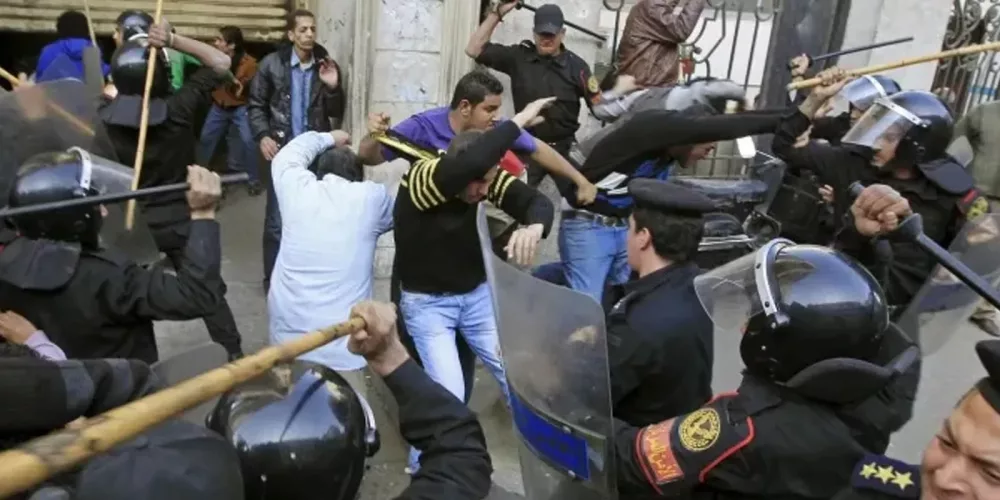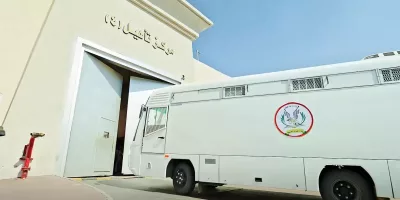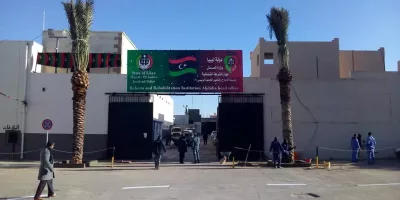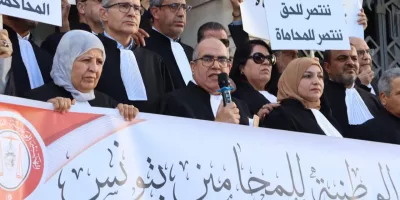The Executive Director of the Committee for Justice (CFJ), Ahmed Mefreh, emphasized that Egypt is witnessing an unprecedented deterioration in human rights conditions amid systematic repression, the absence of the rule of law, and the expansion of arbitrary arrests. The Egyptian regime has increasingly used state tools to silence political activists, journalists, and human rights defenders, while insufficient international pressure has failed to curb these violations.
Mefreh’s remarks came during his opening speech at a side event organized by CFJ on Wednesday, March 19, on the sidelines of the 58th session of the United Nations Human Rights Council. The event was held in collaboration with several civil society organizations focused on Egyptian affairs in Room XXV at the Palais des Nations in Geneva. The event was titled: “Egypt: The Price of Silence – Testimonies on the Human Cost of Failing to Address Egypt’s Human Rights Crisis.”
Mefreh pointed out that the Egyptian regime has not only shut down civic and political spaces but has also intensified its repressive policies, relying on oppressive legislation, unfair trials, and restrictions on civil society. Meanwhile, the Egyptian government continues to make superficial concessions to silence international criticism, without any real commitment to reform or accountability.
In his speech, Mefreh stressed that despite these circumstances, the international community remains hesitant to take a firm stance. Member states of the Human Rights Council have failed to follow up on previous statements regarding Egypt and have not taken genuine steps to pressure the Egyptian authorities. He warned that the continued international silence and lack of concrete measures to hold perpetrators accountable have reinforced a culture of impunity, encouraging the Egyptian regime to escalate its violations without restraint.
– Arrest of Abdel Khaleq Farouk Was Due to His Support for the Middle and Lower Classes:
Mefreh then invited the wife of detained Egyptian economist Abdel Khaleq Farouk to speak, asking whether her husband’s criticism of Egypt’s economic policies was the main reason behind his targeting and how these repressive policies have affected his life and family.
Farouk’s wife responded: “Today marks 150 days since my husband has been in prison, simply because he chose to stand with the middle and lower classes in Egypt.” She noted that her husband had been arrested four times, and she believed this latest detention would not be the last as long as such a system exists in Egypt. “This is not a pessimistic view,” she added, “but a realistic assessment of the situation in Egypt today.”
Farouk’s wife explained that her husband’s latest study, which led to his arrest, was about what he called “The Theft of the Century.” The study was based on official reports and statistics from government institutions such as the Central Auditing Organization. The research spanned 40 articles, with the final piece concluding with a memorandum addressed to the Attorney General outlining systematic corruption in Egypt and calling for an investigation into all these corruption incidents.
Farouk’s wife stressed that her husband has faced numerous violations inside prison that could cost him his life, such as being allowed out of his cell for only one hour a day without exposure to sunlight. He is also isolated from the world and completely cut off from news. Moreover, he has suffered deliberate medical neglect, experiencing three heart attacks and one kidney crisis, and his family has not been allowed to present his medical reports to specialized doctors outside the prison.
– Repression Targets Not Only Mohamed Adel but His Entire Family:
Mefreh then handed the floor to the wife of detained political activist and one of the founders of the April 6 Youth Movement, Mohamed Adel, asking how his consecutive years in prison had affected his life and how his family has been coping with the ongoing pressure they face due to his political activism.
Adel’s wife said: “Mohamed has been detained for 11 years and three months, during which we have endured immense suffering. Some may think he is imprisoned on terrorism charges, but the truth is that he is held on charges related to publishing and expressing opinions — accusations typical for any activist in Egypt. The real reason behind his detention is his prominent role in the January 25 Revolution and subsequent events.”
Regarding his detention conditions in Tenth of Ramadan Prison (Rehabilitation 4), Adel’s wife confirmed that “he is completely cut off from the outside world; he is not allowed to interact with other inmates or learn any news from outside. Despite his young age, the prolonged detention has severely impacted his health. He suffers from multiple bone problems that remain untreated, liver muscle atrophy, fluid buildup in his knee, and unexplained chest pain, yet he has not been allowed to see a specialist.”
Concluding her remarks, Adel’s wife said: “Repression is not limited to Mohamed alone; it extends to our entire family. We cannot even breathe without the authorities’ permission,” adding, “Mohamed deserves a presidential pardon because this prolonged detention has turned his and our family’s life into a tragedy.”
– Long-Term Detention and Its Impact on Detainees and Their Families:
Following this, Ms. Noha Kassem, a mental health activist and wife of political detainee Mahmoud Abdel Moumen, spoke about the psychological and humanitarian toll experienced by political detainees and their families in Egypt, describing how arbitrary arrests and prolonged imprisonment impact the mental well-being of both prisoners and their families.
Kassem said: “It has been ten years and three days since my husband’s arrest.” She added: “My husband was a civilian and served as the deputy head of the Syndicate of Scientists in Alexandria. Despite this, he was tried in a military court on bizarre charges simply because of his legitimate professional and union work. The trial was absurd by all standards; there was no evidence to support the accusations against him.”
Kassem highlighted that “imprisoning someone for a long period without committing a crime is extremely difficult psychologically. The purpose of prison is to allow detainees to reflect on their mistakes and correct them, but political detainees in Egypt are imprisoned for long periods without having committed any wrongdoing. So what are they expected to reflect on?”
She explained that her husband’s detention has affected their daughters as well. When he was arrested, they were young children, and she initially hid news of his torture and the violations he endured. However, as they grew older, it became impossible to conceal these facts from them, causing them significant psychological harm. Many families of political detainees face similar struggles, with their children developing speech impediments and stuttering due to severe emotional stress.
Kassem added that during her last visit to her husband before leaving Egypt, she divided her time between visiting him and providing psychological support to other detainees and their families, many of whom suffer from depression due to prolonged detention without cause or reason.
– “Greste: Egypt Is on the Brink of a New Revolution Due to Ongoing Violations”:
The Australian journalist Peter Greste spoke about the situation inside Egyptian prisons during the events of 2013, when he was detained in Egypt while working as a correspondent for Al Jazeera. He also discussed his decision to go on a hunger strike in solidarity with Dr. Laila Soueif, who was struggling to secure the release of her son, the political activist Alaa Abdel Fattah.
Greste said: “I was in prison in Egypt in 2013 while working as a correspondent for Al Jazeera. I found myself behind bars when I was arrested for our coverage of Egypt’s political crisis at the time, facing extremely serious terrorism-related charges.”
The Australian journalist added: “One of the first prisons I was sent to held many leaders of the January 25 Revolution, such as Mohamed Adel, Ahmed Maher, and of course Alaa Abdel Fattah. I saw how they were all charged with similar accusations — not because of their actions, but because of what they represented and their ability to inspire people and mobilize them to take to the streets and demand their rights, most importantly a democratic and accountable system that serves the people instead of the political elite.”
Greste highlighted that he witnessed numerous cases of violations, torture, breaches of legal procedures, and arbitrary arrests targeting regime opponents. He recounted how some detainees were arrested simply for having a beard in the wrong neighborhood.
Greste warned that the high levels of anger, frustration, and despair resulting from these violations could lead to another revolution — one that might be more violent this time. He concluded his remarks by saying: “I believe Egypt may be on the brink of a new revolution, but this time it could be bloodier, due to the ongoing human rights violations we are witnessing today.”
– Hisham Kassem: The International Community Is in a Dilemma and Must Act”:
Regarding the escalation of political repression in Egypt and how the absence of political and economic competition has worsened the situation, prominent Egyptian publisher and journalist Hisham Kassem explained: “The current regime in Egypt is merely an extension of the military coup that took place in 1952; Egypt has been under military rule for nearly 73 years.”
He added: “At the start of his rule, Sisi declared that no officer would be held accountable for any human rights violations or abuses, which led to the escalation of political repression. People were being arrested on the streets without cause, and young people were forced to hand over their phones for inspection. Even a simple joke about the president on social media could result in a person being sentenced to ten years in prison in some cases.”
Kassem continued: “Recently, I participated in a discussion panel on ‘Political Prisoners’ Day’ alongside Vladimir Kara-Murza from Russia. It was extremely embarrassing because he spoke about 1,500 political detainees in Russia, while when it was my turn to speak, I had to mention that the number of political detainees in Egypt ranges between 60,000 and 100,000. This is not just about political repression; it’s a state of ‘repression madness.’ The situation in Egypt has spiraled completely out of control, with absolutely no safeguards in place.”
Discussing the role of the international community, Kassem stressed that it now faces a dilemma: either continue pumping money — whether through loans or selling Egyptian assets — or face the risk of a complete economic collapse.
He noted that the core problem lies in the fact that these funds are granted to a regime without oversight, as independent media have been completely eradicated, Parliament has become a mere façade with no real influence, and there are no tools for accountability over public affairs or economic management.
Kassem warned: “The international community continues to provide loans to this regime, yet they expect the Egyptian people to repay these debts, despite some of this money never even entering the country. This has become a recurring pattern, and there appears to be no clear way out.”
When asked, “Where is Egypt heading?” Kassem replied: “I cannot say, and I don’t think anyone can predict that. All we know is that the country is in a state of collapse. Therefore, it’s time for the international community to take a serious stance on what’s happening. We don’t want Egypt to end up like Syria; repressive regimes ultimately collapse because they are unsustainable.”
– “Samar El-Husseini: The Egyptian Government Has Perfected the Art of Repression”:
Samar El-Husseini from the Egyptian Human Rights Forum highlighted the situation of human rights defenders in Egypt and the ongoing violations they face, including arbitrary arrests, travel bans, and the closure of civic spaces.
She stated: “The Egyptian government has perfected the art of repression, developing its methods over time. It began with mass arrests of activists and the closure of organizations under Case 173, and later evolved into cross-border repression involving surveillance and online harassment.”
El-Husseini continued: “I am a lawyer and human rights activist, and I have been following the case of a female human rights lawyer who has been detained since 2018. She was sentenced to five years in prison, and after completing her sentence, she was added to a new case with fresh charges, without being allowed to leave prison for even a single day.”
“Outside Egypt, human rights defenders in exile face transnational repression, including intimidation, deprivation of citizenship and consular services, smear campaigns, and proxy punishment of their families. Security cooperation has also been misused to facilitate legal harassment and forced extraditions.”
El-Husseini concluded her remarks by stressing the need for the international community to move beyond statements and declarations and to take concrete and urgent action to protect human rights defenders both inside and outside Egypt.
– “Jeremy Smith: What Is Happening in Egypt Has Negative Implications for the International Community”:
Jeremy Smith, an expert in international human rights policy, addressed how the international community could respond to this crisis. He stated: “The economic crisis in the country and the human rights crisis are deeply intertwined. The problem is that we see, on an international level, that economic and financial aid is provided to Egypt without any meaningful human rights conditions. Even when some conditions are imposed, they are rarely enforced with any real strength.”
Smith expressed his concerns about the international community’s approach to dealing with Egypt, warning that it “only encourages a deeply corrupt and authoritarian regime that continues to oversee the ongoing decline in economic living standards in the country and relies on brutal repression to eliminate any economic or political competition.”
He emphasized that “this short-sighted approach, based on short-term compromises, will ultimately result in greater instability and negative consequences for the international community.”
Smith concluded his speech by stating that the responsibility now lies with the international community to ensure that the voices heard today — and the voices of others — reach global capitals. He urged the use of the Human Rights Council and other tools to force the Egyptian government to face consequences rather than continuing to receive unconditional economic support.
In conclusion, Ahmed Mefreh, Executive Director of CFJ, affirmed that “what we heard today confirms that the human rights crisis in Egypt is not just a domestic issue but an international responsibility that demands a genuine response.”
He added: “The continuation of repression, violations of fundamental rights, and targeting of activists, journalists, and human rights defenders must not be met with silence or neglect.”
Mefreh stressed that “the international community can no longer claim ignorance; all the evidence and testimonies we have presented today demonstrate the urgent need for real action to hold the Egyptian regime accountable. The Human Rights Council, member states, and international human rights organizations must take responsibility and use all available tools to pressure the Egyptian government to stop its violations.
We are here today not only to talk about the crisis but to push for action and change. Our message is clear: ‘Freedom and justice are not privileges; they are rights for every human being, and we will not stop demanding them until they are achieved.'”






